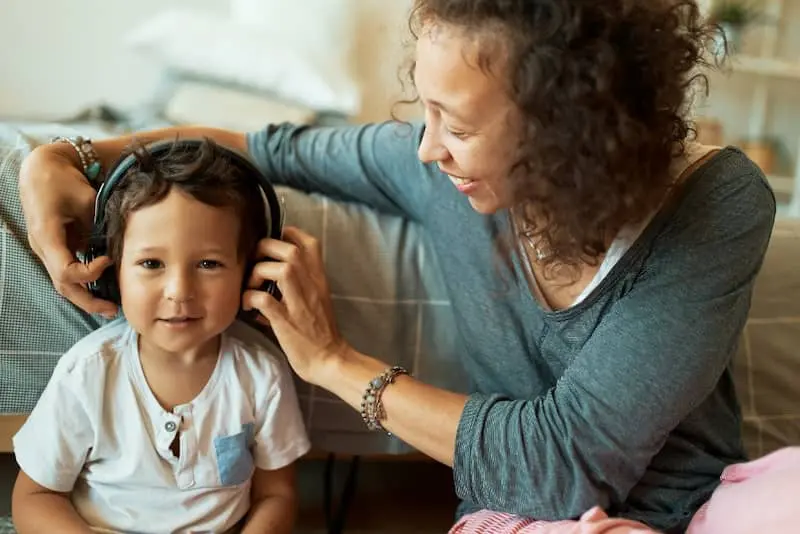By Barry Keate
Barry Keate, has lived with tinnitus over 40 years and has published 150+ research articles on numerous aspects of tinnitus. He is an expert on the condition and a well-known advocate for those with tinnitus.

(karlyukav/Freepik)
Tinnitus can be frustrating to deal with at any age, but caring for a child with the condition can be particularly difficult. It may be especially difficult when the child is preschool age and lacks the vocabulary to describe what they are experiencing.
To help parents recognize the signs and symptoms of tinnitus in children, we have put together this handy parents’ guide so you can be on the lookout for tinnitus in your children and get them the help they need.
What is Tinnitus?
While often associated with older individuals, tinnitus can happen to anyone at any age. It is a hearing condition where individuals perceive sounds without an external source. These sounds typically include ringing, buzzing, whooshing, or clicking. These symptoms can be persistent. While temporary tinnitus can go away in a few days or weeks, others experience permanent tinnitus and live with it 24/7.
There is a direct link between tinnitus and the workings of the inner ear. One of the most delicate parts of the body, the inner ear, utilizes tiny bones and fine hairs to pick up sound waves. Then, nerves transfer the signals to the brain. When these little bones and hairs get damaged, whether from the impact of intense sound waves or from medications like those used in chemotherapy, or physical injury, the signals they transfer can be scrambled. This leads to the perception of sound even when there isn’t one.
Causes of Childhood Tinnitus
Certain lifestyle and career choices in adults can affect hearing health. Frequent clubbing and concert-going, as well as careers in industry, law enforcement, and the military, can all cause damage to the inner ear and are often the root of tinnitus in adults. Children, however, don’t go clubbing and are typically not on shooting ranges or in loud factories. So, how exactly do children end up with ringing in the ears?
Ear Infections
Children tend to get ear infections more often than adults, and some experience them regularly. Frequent ear infections, or particularly intense ones, can cause a great deal of inflammation and fluid buildup that can put pressure on the inner workings of the ear. This pressure can affect the ear’s ability to receive and process sound waves, causing the ear to ring.
Earwax Blockages
When the body produces too much earwax, it can clog up the ear canal, and apply pressure to the rest of the ear. Earwax impaction can become more common with hormone changes, like those in children.
Medical History
If your child has certain medications or cancer treatments, that may be the source of the tinnitus symptoms they are experiencing. Certain antibiotics and anti-inflammatory drugs can cause tinnitus as a side effect, so looking into your child’s medical history for a root cause is essential. Additionally, if your child has had a cancer diagnosis and undergone chemotherapy, the intense nature of the treatment may have damaged the delicate workings of the inner ear.
Loud Noise Exposure
If your child has been exposed to excessively loud noises or listened to loud music with earbuds on, it may cause their symptoms. Intense sound waves can harm the tiny hairs of the inner ear, leading to scrambled sound signals and perceived noises.
Abnormal Development
As children grow, certain parts of their bodies may develop differently. Poor jaw alignment and abnormal growth in the middle ear bones can cause inner ear changes. These changes can affect how sound travels to the inner ear and the development and placement of inner ear bones and hairs. These differences in development can lead to the ringing, buzzing, and whooshing sounds associated with tinnitus.
Recognizing Childhood Tinnitus
Since children, especially younger ones, have less communication skills, it can be challenging for them to explain the symptoms they are feeling. They may not realize anything is wrong or do not know how to tell you what they feel. Below are a few things to look out for. If your child displays any of these behaviors, it may be a good idea to bring them to a pediatric ENT specialist and investigate the possibility of tinnitus.
Sleep Issues
While many children have irregular or disruptive sleep patterns, it is essential to know that this is a common result of tinnitus. The ringing sounds of tinnitus can make it difficult to fall asleep and stay asleep, but your child may not know that. If they frequently complain that they can’t go to sleep, even if they are tired, or wake up constantly in the middle of the night, look into whether tinnitus may be to blame.
Restlessness
Of course, children tend to have far more energy than adults, but if your child has particular difficulty sitting still, has a poor attention span, or gets restless, it may be tinnitus. The constant perception of noise can be exceptionally irritating and lead to children needing to move or occupy themselves to distract from it.
Behavioral Changes
If your young child is throwing unexplained tantrums more frequently, the irritability of tinnitus symptoms may be getting to them. Because children are less capable of managing their emotions than adults, the persistent nature of ear ringing may cause them to lash out with tantrums.
Protecting Your Children
Any parent’s priority is to ensure that their child is happy and healthy. Protecting your child’s hearing should be a part of that. While you may not be able to protect your child from the effects of essential medications or prevent abnormal growth patterns, the best thing you can do is protect your child’s ears from loud noises.
Provide them with hearing protection at concerts, fireworks shows, and sporting events. As your children get older to teach them that listening to loud music, particularly with earbuds, can cause permanent hearing impairments, like tinnitus. Protecting hearing starts with prevention and education.
It is crucial that your child has a well-rounded diet that supports hearing health. What vitamins and minerals help with tinnitus? Vitamin B12 is excellent for hearing health. Try to incorporate meat, eggs, and dairy products high in vitamin B12 into your child’s diet. The link between zinc and tinnitus can be a great reason to include more oysters, legumes, and even dark chocolate.
Helping your children through hearing difficulties can be a struggle. However, the more informed you are about the symptoms and treatments of tinnitus, the better you can care for your child.
Get Free Shipping!
Order now and get free shipping on either the Tinnitus Starter Kit or Combo Pack. Try the doctor recommended products with clinically proven ingredients for tinnitus. No coupon code required.

